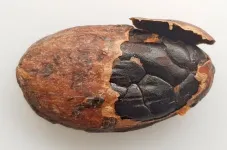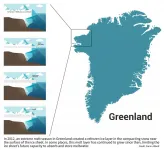Who likes chocolate that smells like smoke or mold, or chocolate whose aroma is reminiscent of a horse stable or of mothballs? Off-flavors are a major problem, especially for small and medium-sized enterprises. However, also for larger companies, off-flavor-tainted cocoa batches can cause immense economic damage, posing the need for their reliable identification during the incoming goods inspection. Until now, this has only been possible with some limitations by using a trained sensory panel, since no approach to objectively evaluate off-flavors in cocoa on the basis of the concentrations of the causative odorants was available.
As part of a project of the Research Association of the German Food Industry, the team led by food chemist Martin Steinhaus has now made a significant contribution to solving this problem. Using the molecular sensory science concept established at the Leibniz Institute, the research group has identified the key odorants that chiefly contribute to typical off-flavors in fermented cocoa.
Off-flavors from hammy-smoky to moldy-musty
In cocoa samples with hammy-smoky off-flavors, the team identified six crucial odorants. The substances smelled smoky, hammy, phenolic or horse stable-like. In samples with a moldy-musty odor, the researchers found additional four off-flavor compounds. These smelled moldy, musty, beetroot-like, fecal- or mothball-like. The research team determined the odor threshold values of the identified substances in order to derive maximum concentration limits.
In its latest publication, for example, the team recommends a maximum tolerable concentration for the off-flavor substance geosmin of 1.6 micrograms per kilogram of fermented cocoa. Even in the lowest concentrations, this odorant has a musty, earthy smell reminiscent of beetroot. Geosmin is presumably of bacterial origin. For fecal, mothball-like smelling 3-methyl-1H-indole, the researchers recommend a limit of 1.1 micrograms per kilogram of fermented cocoa.
Odorant distribution is also important
The research team's findings also show that about 40 to 65 percent of total geosmin is found in the seed coat (testa) of fermented cocoa beans. In contrast, the off-flavor substance 3-methyl-1H-indole was predominantly found inside the beans. "The uneven distribution of the two odorants between the seed coat and the embryo is another important aspect that chocolate manufacturers should consider when testing fermented cocoa," says Martin Steinhaus. "At the moment, we do not know how much geosmin is transferred from the shells into the embryo during the roasting process. Therefore, it might be reasonable to remove the seed coats before roasting rather than after roasting."
INFORMATION:
Original publications
Porcelli C, Neiens S, Steinhaus M (2021) J Agric Food Chem. Molecular background of a moldy-musty off-flavor in cocoa, pubs.acs.org/doi/10.1021/acs.jafc.1c00564
Füllemann D, Steinhaus M (2020) J Agric Food Chem, 68: 10833-10841, DOI: 10.1021/acs.jafc.0c04633. Characterization of odorants causing smoky off-flavors in cocoa, pubs.acs.org/doi/10.1021/acs.jafc.0c04633
Background information
Funding
This IGF Project of the FEI was supported via AiF within the program for promoting the Industrial Collective Research (IGF) of the German Ministry of Economic Affairs and Energy (BMWi), based on the resolution of the German Parliament (project no. 19455 N).
Facts provided by the Federal Association of the German Confectionery Industry
The German cocoa and chocolate industry includes around 90 companies. They process approximately 400,000 metric tons of fermented cocoa annually, most of which comes from Africa. Since 2011, the share of sustainably produced cocoa has increased from 3 to 77 percent in 2020. According to a representative survey by respondi AG, the most popular types of chocolate in Germany include: milk chocolate, nougat, dark and bittersweet chocolate, as well as white and hazelnut chocolate. In 2019, German companies produced a total of 220 million chocolate Easter bunnies. Of these, 106 million were exported. The main export countries include the EU, the USA, Canada and Australia, https://www.bdsi.de/zahlen-fakten/rohstoffverarbeitung/.
Expert contact:
PD Dr. Martin Steinhaus
Head of Section I and head of the Work Group Sensory Systems Chemistry
Leibniz Institute for Food Systems Biology
at the Technical University of Munich
Lise-Meitner-Str. 34
85354 Freising, Germany
Tel.: +49 8161 71-2991
Email: martin.steinhaus@tum.de
Press contact:
Dr. Gisela Olias
Knowledge Transfer, Press & Public Relations
Leibniz Institute for Food Systems Biology
at the Technical University of Munich
Lise-Meitner-Str. 34
85354 Freising, Germany
Tel.: +49 8161 71 2980
E-Mail: g.olias.leibniz-lsb@tum.de
http://www.leibniz-lsb.de
Information about the Leibniz Institute
The Leibniz Institute for Food Systems Biology at the Technical University of Munich (Leibniz-LSB@TUM) has a unique research profile. Its researchers combine methods of basic biomolecular research with analytical methods of bioinformatics and analytical high-performance technologies. Their goal is to decode the complex ingredient profiles from raw materials to the final food products and to elucidate their function as biological active molecules on humans. Based on their studies, the scientists develop products, which are as healthy as they are tasty. These foods will help to provide a sustainable and sufficient stream of food for future generations. In addition, the new scientific findings will be used to develop personalized nutritional concepts that, for example, help people with food intolerance without compromising quality of life and endangering their health.
The Leibniz LSB@TUM is a member of the Leibniz Association, which connects 96 independent research institutions. Their orientation ranges from the natural sciences, engineering and environmental sciences through economics, spatial and social sciences to the humanities. Leibniz Institutes devote themselves to social, economic and ecological issues. They conduct knowledge-oriented and application-oriented research, also in the overlapping Leibniz research networks, are or maintain scientific infrastructures and offer research-based services. The Leibniz Association focuses on knowledge transfer, especially with the Leibniz Research Museums. It advises and informs politics, science, business and the public. Leibniz institutions maintain close cooperation with universities - among others, in the form of the Leibniz Science Campuses, industry and other partners in Germany and abroad. They are subject to a transparent and independent review process. Due to their national significance, the federal government and the federal states jointly fund the institutes of the Leibniz Association. The Leibniz Institutes employ around 20,000 people, including 10,000 scientists. The entire budget of all the institutes is more than 1.9 billion euros.
+++ Via our Twitter channel https://twitter.com/LeibnizLSB you stay up to date +++




